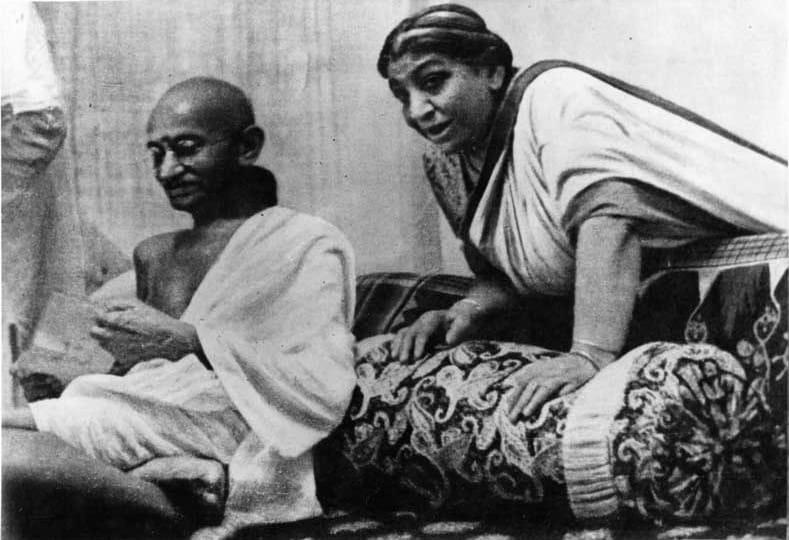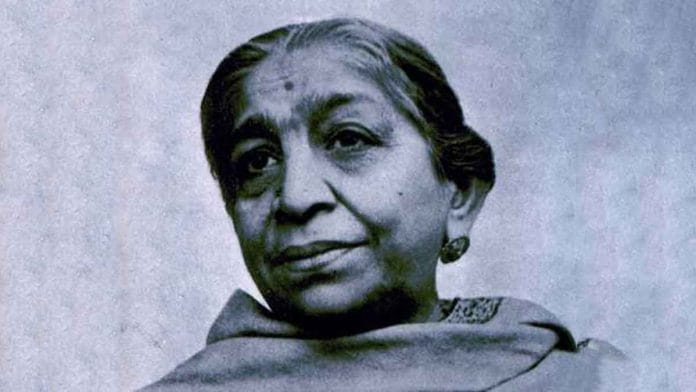Mother, O Mother, wherefore dost thou sleep?
Arise and answer for thy children’s sake!
Thy Future calls thee with a manifold sound
To crescent honours, splendours, victories vast;
Waken, O slumbering Mother and be crowned,
Who once wert empress of the sovereign Past.
— To India, by Sarojini Naidu
A poet, orator, freedom fighter and advocate of women’s rights — these are some of the roles that Sarojini Naidu played through her life. The dynamic leader who dedicated herself to working towards a better India was ever ready for challenges. Whether it was using her poetry to address social issues, representing India at international forums, fighting for women’s rights or braving the British’s lathicharge during the civil disobedience movement, Naidu did it all.
On her 140th birth anniversary, ThePrint looks back at the life and times of the ‘Nightingale of India’.
‘Bulbul-i-Hind’
Naidu was an active participant in the freedom struggle and one of the major proponents of women’s rights during that time. Along with Annie Besant, she founded the Women’s India Association in 1917. As a member of the Constituent Assembly, Naidu urged the members of the assembly to focus on women’s education and abolishing child marriage.
Once during a Constituent Assembly meeting, when chairman Dr Sachchidananda Sinha invited Naidu to speak, he referred to her as ‘Bulbul-i-Hind’.
“I shall now request Bulbul-i-Hind, the Nightingale of India, to address the House,” he said.
Naidu took the dais and said, “Bulbul ko gul mubarak, gul ko chaman mubarak, Rangeen tabiaton ko rang-e-sukhan mubarak.
(Nightingale is happy to be with the flower, the flower is happy to be in the garden, People with colourful personalities are happy with poetry.)”
It was this wit and charm that made Naidu popular among political leaders of the time, and the public. Many national and international leaders were in awe of Naidu’s persona.
“The charm of her personality and the magic of her words endeared her to millions to whom she was aptly known as the Nightingale of India,” Sardar Vallabhbhai Patel said on Naidu’s death.
It wasn’t just the public and the leaders who were enchanted by Naidu — writer Nayantara Sahgal recalled in an article that the visit of Naidu, a close friend of her grandfather Motilal Nehru, to her house was full of “fun and festivity”.
“She was a gifted mimic with stories to tell about people she had met on her travels, who were as unlike as a dhoti-clad traveller met on a train and movie idol John Barrymore, met at Bombay’s Taj Mahal Hotel, and she had a way of accompanying her anecdotes with gestures that had us in fits of laughter,” wrote Sahgal.
Also read: Jamnalal Bajaj, the Gandhian capitalist who was the Mahatma’s ‘Merchant Prince’
A poet, politician and activist
Naidu was born on 13 February 1879 to a Bengali family in Hyderabad. Her father Aghornath Chattopadhyaya was the principal of Nizam College, Hyderabad. Her mother Barada Sundari Devi was a Bengali poet.
Young Sarojini, a prodigy of her time, completed high school by the time she was 13. A bright student, she was well versed in Bengali, Urdu and Telugu, besides English. At that young age, she had already written a play. Naidu’s father was so impressed with her writing prowess that he sent the text to the Nizam of Hyderabad who awarded her a scholarship of £300 to study abroad.
And so a young Sarojini left for England where she studied at King’s College, London, and then at the Girton College, Cambridge. She returned to India in 1898 and married Dr M. Govindrajulu Naidu, principal medical officer of the Nizam of Hyderabad.
A life confined to the walls of domesticity and tradition never appealed to her. Apart from publishing poetry anthologies like The Golden Threshold (1905), The Bird of Time: Songs of Life, Death and the Spring (1912) and The Broken Wing: Songs of Life, Death and Destiny (1917), Naidu was active in politics too.
Although she made several public appearances at various events, she became a household name after she joined the non-cooperation movement in 1919 under the tutelage of Mahatma Gandhi.
Naidu was also the second woman president (the first Indian) of the Indian National Congress, and chaired its annual session in Kanpur in 1925.
Also read: Bhupen Hazarika: The ‘Bard of Brahmaputra’ who took Assamese music to the world
Friendship with Mahatma Gandhi
Naidu worked closely with Mahatma Gandhi during the many movements he launched to end the British rule in India.
Describing her first meeting with Gandhi, Naidu said that when she went to see him for the first time in an “unfashionable house”, she found a “living picture of a little man with shaven head, seated on the floor on a black prison blanket and eating a messy meal of squashed tomatoes and olive oil out of a wooden prison bowl.”
When he offered her food, she said, “No, thanks…what an abominable mess it is!”
Naidu and Gandhi’s friendship eventually bloomed into what she referred to as “real comradeship, and bore fruit in a loving, loyal discipleship” over the next three decades. She affectionately referred to Gandhi as ‘Mickey Mouse’.

Naidu also represented India during the Versailles peace treaty — the treaty that brought World War I to an end.
She remained an active part of Indian politics even after Independence. She was the first woman Governor of the then United Provinces — from 15 August 1947 till her death on 3 March 1949.
After her sudden demise due to a heart attack, leaders from across the country condoled her death. Her brother and famous poet Harindranath Chattopadhyaya penned a poem to pay tribute to his elder sister.
“Sister of me! Sister of millions more!
You were a boat under the moon, the sun,
Travelling untiringly from shore to shore,
And now, in death, Q Boat! you have begun
Another voyage bearing us along
Towards true freedom’s meaning, since you yet
Inspire us like a deathless fire of song
That neither we, nor ages, dare forget!”
Also read: Today is International Women’s Day, but many Indians celebrate it on 13 February






